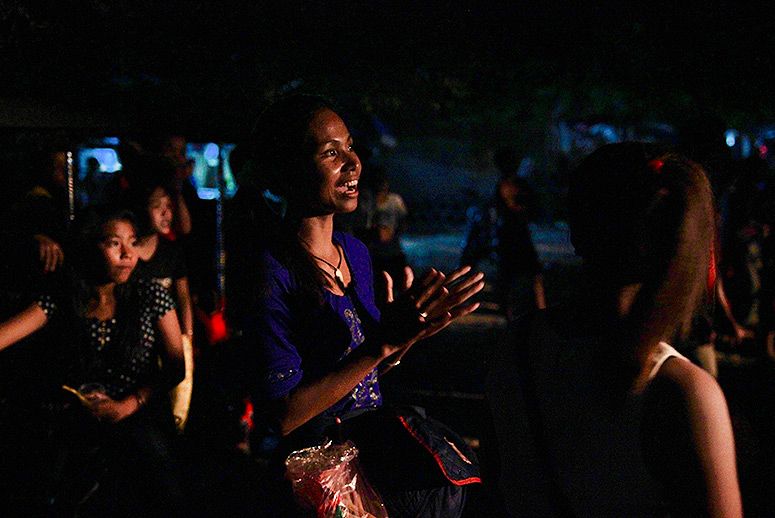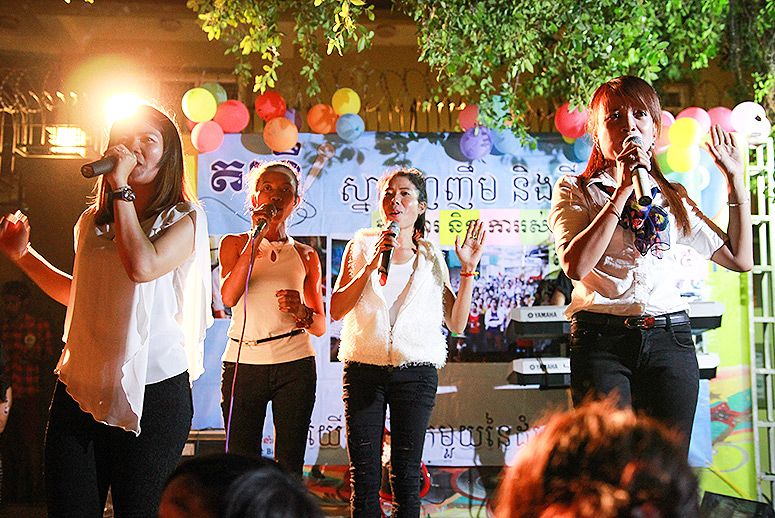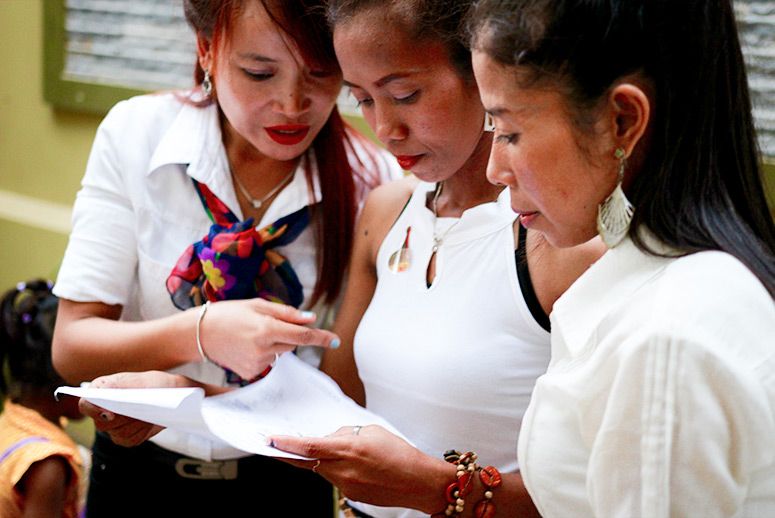The Messenger Band’s lyrics address serious issues that garment workers face: poor health care, low wages, and long hours.
Cambodia was the scene of bloody crackdowns on protesting garment industry workers and their supporters in 2013 and 2014.The protesters were demanding that the minimum wage be doubled from $80 a month to $160 to adjust for inflation and cost of living.
Four of the six members of the Messenger Band (from left, Leng Leakhana, Nam Sophors, Kao Sochevika, and Chrek Sopha) take the stage. (Photo: Zanna McKay)
The garment industry is the largest exporter in the country at an estimated $5 billion a year, making up 16 percent of its GDP. In the end, five people died, dozens were injured, and many more were arrested—marking the worst violence Cambodia had seen since the 1997 clashes over elections.
On a recent Sunday evening, just off Veng Sreng Boulevard in Phnom Penh, where four protesting garment workers were shot to death by police in January 2014, a crowd gathered for a small community concert.
ADVERTISEMENT
Against the backdrop of the high concrete and barbed wire walls of a garment factory, a well-lit stage hosted comedy, theater, dance, and music acts. The crowd drew onlookers as the evening progressed and the audience—many of them employed at the factories themselves—laughed, sang, danced, and clapped along. Though the mood was jovial, the issues addressed in the lyrics and scripts were serious: poor health care, wages that are barely enough to survive on, long workdays, and the pollution of their country’s natural resources.
This is the ideal evening for the Messenger Band, an all-female grassroots NGO made up of former garment workers who educate and mobilize laborers through music and entertainment.
When the audience hears lyrics they can identify with, says Vun Em, a longtime member of the Messenger Band and a former worker in the garment industry, “they ask, where is this music coming from? It encourages them to reach out to each other, even if it’s just to make friends.”
Workers’ rights are the main focus of the Messenger Band’s mission, but quality of daily life for garment industry workers is another important aspect of their work, which is why they incorporate dance, theater, and comedy into their concerts. As a hip-hop dance crew from a local university pumped up the crowd to “Turn Down for What,” Em clapped along.
“They have no time to enjoy their lives. I love this, I want them to be able to see this with their own eyes, not just on TV,” she says.
 Messenger Band member Vun Em claps along to CCF, the hip-hop dance crew the band brought as part of the entertainment for the night. (Photo: Zanna McKay)
Messenger Band member Vun Em claps along to CCF, the hip-hop dance crew the band brought as part of the entertainment for the night. (Photo: Zanna McKay)
The Messenger Band is part of a broader organization called the United Sisterhood Alliance. It also includes the Workers Information Center; the Women’s Network for Unity, which advocates for the rights of sex workers; and Social Action for Change, a group of women activists who deal with development practices and inequality in Cambodia from a grassroots perspective. But each group sets its own agenda and works independently.
“Music and art are a part of people’s lives,” says Channsitha Mark of the Workers Information Center. “The Messenger Band’s work is very important for mobilizing people. It raises awareness, and it’s fun at the same time.”
Messenger Band members go over their set list backstage. (Photo: Zanna McKay)
Not only do the members of the Messenger Band have personal experience with the issues they sing about, but they also gather their material directly from the community by hosting collaborative music composition classes at the Workers Information Center.
ADVERTISEMENT
As some of their students took the stage on Sunday to sing songs composed in those classes, as well as covers of Messenger Band songs, several people in the audience took out their phones to take pictures and videos. The Messenger Band’s ultimate goal is to get garment industry workers to reflect on their lives and become more united in the process.
The band also holds concerts in rural farming villages, where many of the garment workers come from, to inform families about the real conditions workers face in the garment industry, such as low wages and long hours, and to discuss why political action is necessary.
“They don’t always understand why we are protesting,” says Em. “We get the families who sent their daughters to work in the factories to talk to each other more about what it’s really like.”
Many garment workers, of which 90 percent are women, arrive from rural villages expecting to be able to send some money back to their families but find very little left at the end of each month with such a low salary. “Talking to farming families is important for completing the circle of awareness,” says Sok Thareth of the Workers Information Center.
The minimum monthly wage for garment workers in Cambodia is set to be raised to $140 in 2016, still less than what has been deemed a fair minimum by unions and protesters.
The Messenger Band plans to discuss new strategies and set priorities in early 2016, but the most crucial aspect of its work—mobilizing workers at events where they can enjoy themselves and have fun—remains constant, according to Em.
“When they hear these songs, they feel they are not alone,” she says.
Publish by: TakePart.com





